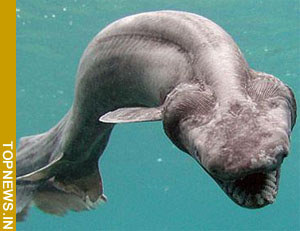Oldest shark braincase shakes up assumptions about vertebrate evolution
 Washington, Jan 15 : A team of scientists has said that the earliest known braincase of a shark-like fish has shown that some assumptions about the early evolution of vertebrates are "completely wrong."
Washington, Jan 15 : A team of scientists has said that the earliest known braincase of a shark-like fish has shown that some assumptions about the early evolution of vertebrates are "completely wrong."
According to a report in National Geographic News, the specimen is of a 415-million-year-old Ptomacanthus, which is only the second known example of a braincase from an Acanthodian, a long-extinct group of fossil fish.
The other braincase, from a species called Acanthodes, dates to a hundred million years after the Acanthodian group came into existence, casting most of this period of the group''s evolution into shadow.
"We've known about (Acanthodians) for 150 years or more, but the braincase has always been missing," said study lead author Martin Brazeau, a Ph. D. student at Uppsala University in Sweden. "To fit it in now is kind of exceptional," he added.
Before this discovery, most scientists believed that the braincases of Acanthodians resembled those of bony fish, and were thus related to this type of animal.
But, data from the new fossil support an emerging idea that the ancient group of fish included a diverse tableau of shapes and characteristics that defy clear-cut categories.
The primitive fish's softer skeletons did not fossilize well, leaving scientists few braincases or other parts to study.
But, Brazeau suspected that in the right circumstances, some bones could withstand time.
So, he took a closer look at the well-preserved Ptomacanthus specimen that had been in the literature for 30 years.
"Sure enough, the specimen had its braincase preserved," he said.
The ancient creature has distinct features of a shark-swirling rows of teeth and a short snout, for instance-and looked little like the early bony fish suggested by the Acanthodes braincase.
Such differences within the same group rock earlier assumptions that a certain set of species with similar characteristics fit in clearly defined categories.
Grouping fish in this way "gives us a coarse picture of evolution," said Brazeau.
"We need to find intermediaries between groups, find more fossils, and go and see if we''ve missed some," he added.
According to Michael Coates, a professor of organismal biology at the University of Chicago, "The common perception is that sharks are somehow primitive relative to bony fish - foundations that are sketchy at best.
"It's an important piece in the puzzle for trying to understand one of the biggest events not only in our own evolutionary history, but also the vast majority of living animals with backbones," he said. (ANI)